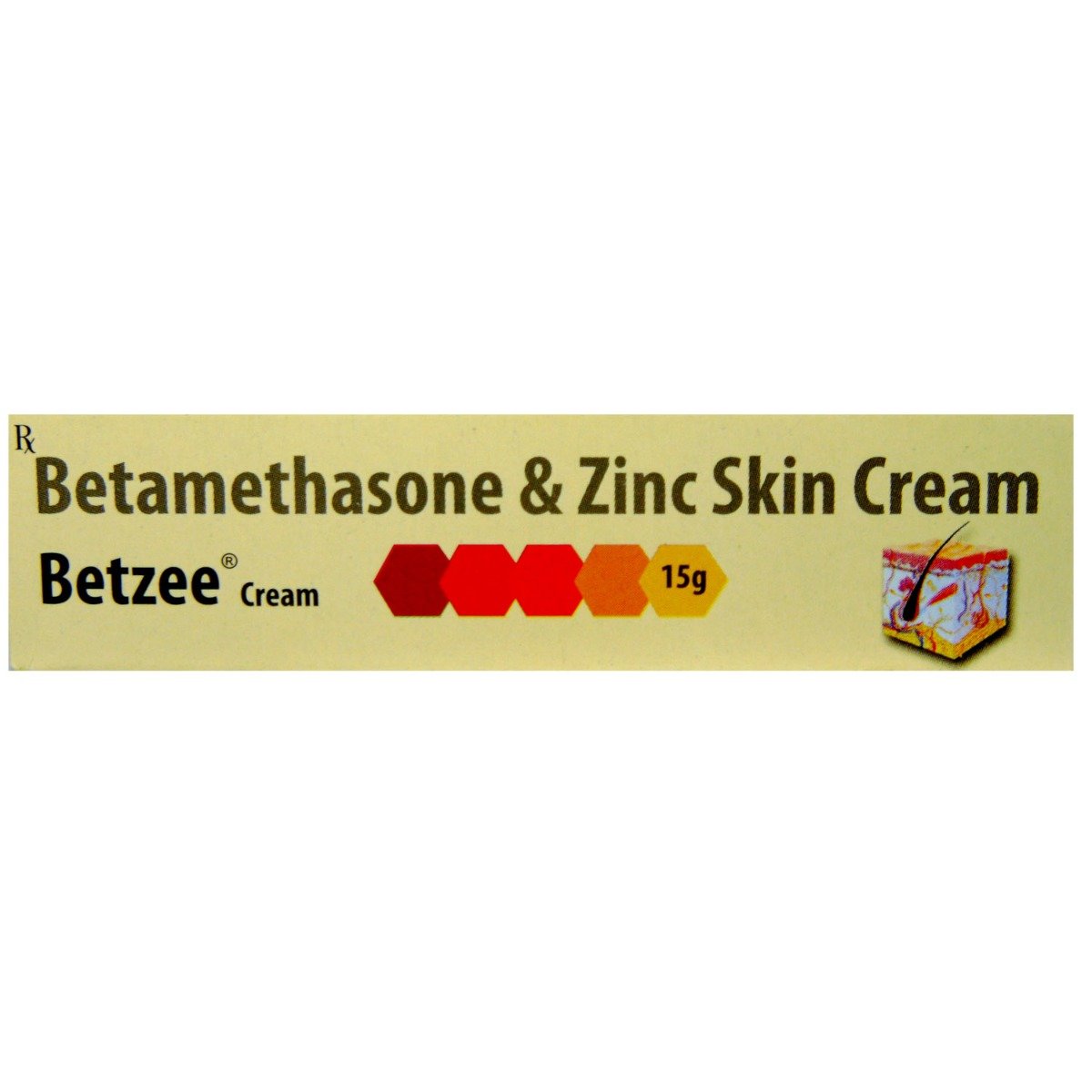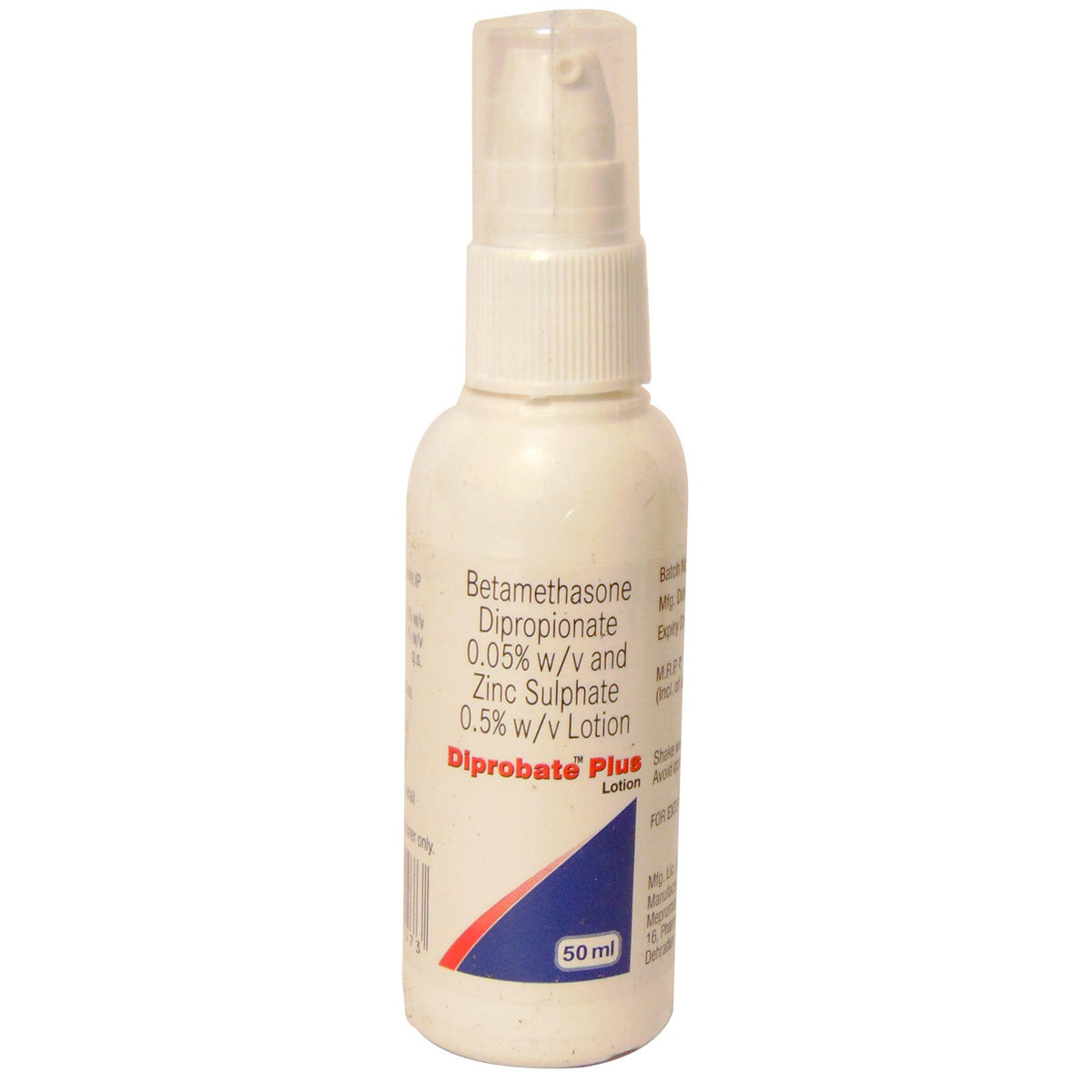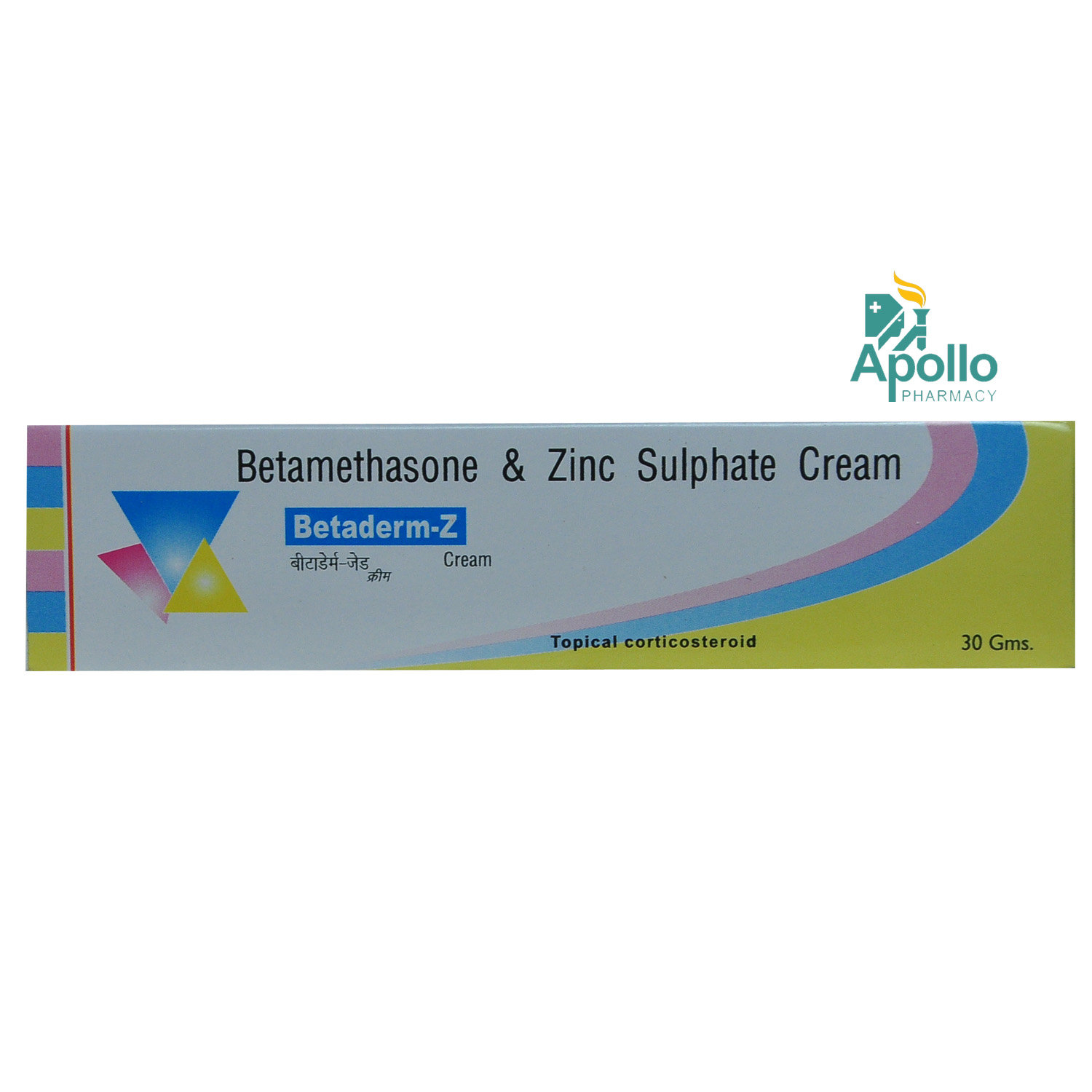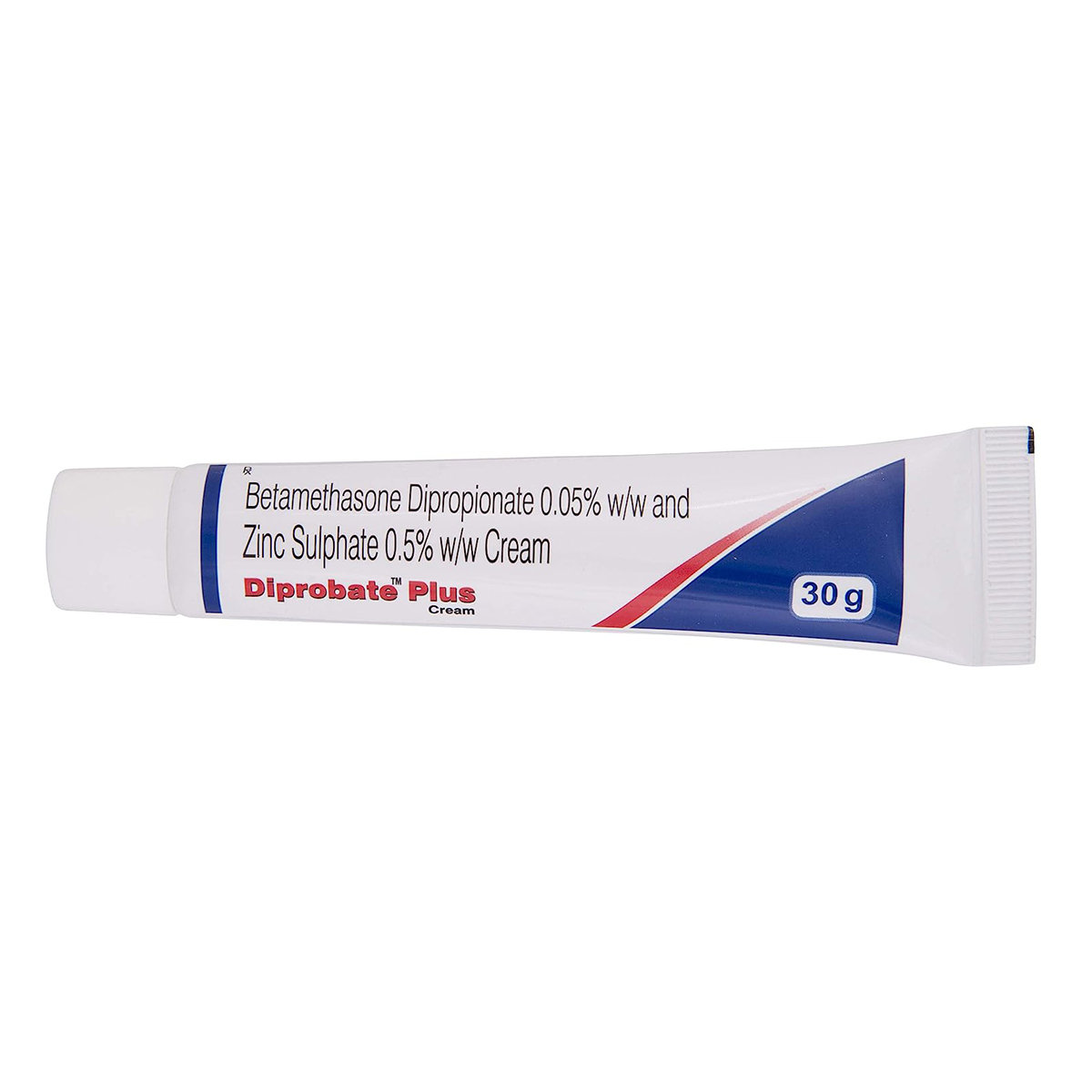Betamethasone+zinc
About Betamethasone+zinc
Betamethasone+zinc belongs to the class of medications called ‘dermatological agents’ used to treat eczema, contact dermatitis and psoriasis. Eczema is a condition in which skin becomes red, itchy and inflamed due to external agents such as soaps, dyes or other irritants. Psoriasis is an autoimmune (immune system attacks healthy cells) skin disorder in which the skin becomes scaly, swelled up and itchy.
Betamethasone+zinc is a combination of two medicines: Betamethasone and Zinc. Betamethasone is a steroid and anti-inflammatory agent that blocks prostaglandin's production (chemical messengers that make the affected area red, swollen, and itchy). It also helps to reduce immune response, thereby controlling inflammation. Zinc acts as an antiseptic (prevents microbe's growth) and astringent (contracts the skin cells) on the skin.
Betamethasone+zinc is for external (for skin) use only. You should use this medicine exactly as prescribed by your doctor. The common side-effects of Betamethasone+zinc are redness, inflamed hair follicles, itching, and blistering at the application site. These side effects are usually mild and temporary. However, if any of these side effects persist or get worse, inform your doctor immediately.
It is not recommended to take Betamethasone+zinc if you are allergic to any contents of it, or developed any skin irritation or other reaction to steroids in the past. Before taking Betamethasone+zinc, inform your doctor if you have skin atrophy (thinning of the skin) at the treatment site, diabetes, adrenal gland problems, liver problems and eye problems such as cataract (clouding of the eye) or glaucoma (increased pressure inside the eye). Betamethasone+zinc should be used with caution in pregnant and breastfeeding women. Betamethasone+zinc is not recommended for use in children below 13 years of age. Betamethasone+zinc should be used with caution in elderly patients. Betamethasone+zinc may not affect your ability to drive.
Uses of Betamethasone+zinc
Medicinal Benefits
Betamethasone+zinc is used to treat inflammatory skin conditions such as eczema (atopic dermatitis), contact dermatitis and psoriasis. It helps relieve symptoms such as redness, swelling, and itching effectively. For the best results, you should strictly use for a duration prescribed by the doctor.
Directions for Use
Storage
Side Effects of Betamethasone+zinc
- Redness at the application site
- Inflamed hair follicles
- Itching
- Blistering
Drug Warnings
Betamethasone+zinc is for topical (skin) use only but is not recommended for use on larger areas of skin. It would be best if you did not cover the treated area with a bandage or plaster, especially the face, without checking with your doctor. Do not use the medicine in and around your eyes. If the medicine accidentally gets into your eyes, nose, mouth, or genitals, rinse with water thoroughly. Inform your doctor immediately if you notice swelling or weight gain around the trunk or in the face, as it may be a sign of Cushing’s syndrome (high levels of cortisol in the body). Please do not use this medicine for longer than recommended by your doctor as it may suppress adrenal gland function and may increase the risk of vision problems. Betamethasone+zinc should be used with caution in patients with diabetes as it can increase blood glucose levels. It is not recommended for fungal skin infections. If you notice any persistent skin irritation or worsening of the skin disease, stop using Betamethasone+zinc and inform your doctor immediately.
Drug Interactions
Drug-Drug Interactions: Betamethasone+zinc may interact with other steroids (dexamethasone, fluocinolone, beclometasone, and mometasone, etc.), medicines used to treat HIV (ritonavir and cobicistat), and medicine used to treat fungal infections (itraconazole).
Drug-Food Interactions: No interactions found.
Drug-Disease Interactions: Betamethasone+zinc should be used with caution in patients with diabetes, adrenal gland problems, liver problems, and eye problems such as cataract (clouding of the eye) or glaucoma (increased pressure inside the eye).
Drug-Drug Interactions Checker List:
Safety Advice

Alcohol
safe if prescribedBetamethasone+zinc may not interact with alcohol.

Pregnancy
cautionBetamethasone+zinc is a Category C pregnancy drug and may cause harmful effects on the unborn baby. So, it is given to a pregnant woman only if the doctor thinks the benefits outweigh the risks.

Breast Feeding
cautionBetamethasone+zinc may pass into breastmilk and cause harmful effects in the nursing baby. So, it is given to a breastfeeding mother only if the doctor thinks the benefits outweigh the risks.

Driving
safe if prescribedBetamethasone+zinc may not affect your ability to drive.

Liver
cautionBetamethasone+zinc should be used with caution in patients with liver diseases. The dose may have to be adjusted by your doctor.

Kidney
cautionBetamethasone+zinc should be used with caution in patients with kidney diseases. The dose may have to be adjusted by your doctor.

Children
unsafeBetamethasone+zinc is not recommended for children below 13 years as there is a risk of growth retardation.
Habit Forming
Diet & Lifestyle Advise
- Use mild soap while taking baths and prefer warm baths.
- Avoid harsh products on your skin.
- Do not scratch or pick your skin to avoid getting the affected area infected.
- Manage stress, eat healthily, drink plenty of water, exercise regularly, and get plenty of sleep.
- Limit food intake that might trigger allergies such as dairy products, soy, eggs, and nuts.
- Avoid consumption of foods with excess sugar as it may flare up inflammation.
- Include fruits, vegetables, whole grains, healthy fats, and fish in your diet.
- Avoid getting in contact with harsh soaps, detergents, and rough fabrics.
Special Advise
- If applied to the eyelids, care is needed to ensure that the preparation does not enter the eye, as cataract and glaucoma might result from repeated exposure.
- Do not apply on open and cut wounds.
Patients Concern
Disease/Condition Glossary
Eczema: Eczema is also known as atopic dermatitis. It is a skin inflammatory condition characterized by red and itchy rashes. The most common cause of eczema is allergies. Contact with soaps, dyes, chemicals or other irritants may trigger rashes. Avoiding the triggers helps to prevent flare-ups of eczema.
Contact dermatitis: Contact dermatitis is when the skin becomes red and inflamed after it comes in contact with any allergens (causes allergy or irritation). Symptoms include dry, itchy or swollen skin.
Psoriasis: Psoriasis is an autoimmune skin disease characterized by red, itchy and scaly rashes. This condition occurs when skin cells grow and build up rapidly resulting in scaly rashes. It is a chronic disease and doesn’t have a permanent cure. So, to avoid flare-ups of the disease, avoid triggers such as stress and cold.
FAQs
A Betamethasone+zinc is used to treat inflammatory skin conditions such as eczema, psoriasis, and contact dermatitis. It is a combination of two medicines: Betamethasone and Zinc. Betamethasone is a steroid and anti-inflammatory agent that blocks prostaglandins production (chemical messengers that make the affected area red, swollen, and itchy). Zinc acts as an antiseptic (prevents microbe's growth) and astringent (contracts the skin cells) on the skin.
Betamethasone+zinc is for topical use (for skin) only. Do not use Betamethasone+zinc on the face and avoid contact with eyes, nose, mouth and genitals. Do not put a bandage or a dressing on the affected area while using Betamethasone+zinc unless advised by the doctor. Please do not use it on larger areas and for prolonged periods unless prescribed by the doctor.
The common side-effects of Betamethasone+zinc are redness, inflamed hair follicles, itching, and blistering at the application site. These side-effects are usually mild and temporary. However, if any of these side-effects persist or get worse, inform your doctor immediately.
Inform your doctor before using any medications while using Betamethasone+zinc. If the doctor prescribes other skin creams or ointments along with Betamethasone+zinc, you should maintain an interval of at least 30 min between the two medications.
Betamethasone+zinc is not recommended to treat diaper rash or redness. However, please consult a doctor before using Betamethasone+zinc in children.








